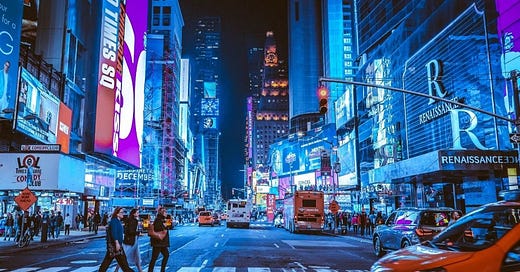Reading that Andrew Yang conceded in New York City’s mayoral race last Tuesday night was a sigh of relief. The thought of Yang running the biggest city in America had been irking me since I heard him discuss rejuvenating the economy at the expense of the disability community, specifically those with mental illnesses, the day prior.
“We need to get them the care that they need, but that will also supercharge our economic recovery because we all see these mentally ill people on our streets and subways, and you know who else sees them? Tourists. And then they don’t come back, and they tell their friends, ‘Don’t go to New York City,’” Yang said.
“We’re never going to get our jobs back and our economy back if we don’t get the mentally ill people who are on our streets in a better environment,” he added. But these weren’t out of the blue. He gave a preview during an earlier debate, saying, “yes, mentally ill people have rights, but you know who else have rights? We do! The people and families of the city.”
Many have lashed out at Yang, calling his comments insensitive, but even that undermines the impact they have on the disability community. It’s pretty simple: Yang said the quiet part out loud. He does not see disabled people as “the people and families of the city” — he sees me and others with disabilities as objects. He sees giving us the care we need as important not because it’s what will keep us alive but because it will help the economy.
And he thinks disabled people are a threat to tourism, which is extremely dehumanizing — and something to say about crime and other social problems. It’s an extension of the age-old tale that people with disabilities are undesirable and need to be hidden, where disability discrimination is a way of overlooking society’s flaws — whether the idea that people aren’t perfect or that America isn’t accessible and inclusive for all.
But disabled people are not the problems. We have to overcome a number of social problems on a daily basis — and Yang’s rhetoric represents each one. We are not a threat to anyone. We just want access, support and justice.
That last part says it all, and shows his disregard for those impacted by his rhetoric. When I hear or read, “yes, mentally ill people have rights,” I can envision Yang’s accompanying invisible eyeroll. I can feel the insincerity, the fakeness, the appeasement, even the obligation to acknowledge the community. It was more of a legality, a nod. And as I read the second part — “but you know who else have rights? We do!” — I can hear an ensuing roar from his supporters. Besides, if he wanted to sincerely recognize people struggling with mental health, he would’ve found a way, especially coming off of over a year of isolation. He doesn’t.
He, instead, created more isolation, coming out shamelessly and says mentally ill people aren’t part of the “we,” the city population — who he had hoped to be serving. And he acknowledged helping mentally ill people, but said the support would only come because of tourism. But it was about getting people off the streets, which would suggest further institutionalization and less inclusion for people struggling with mental health. He talked about getting them “in a better environment.” But he didn’t elaborate, and it sounds like he’s suggesting isolating these people from the rest. of society. I have heard people push disabled people to the side, but nothing as open and blatant as this. It puts a pit in my stomach, and works as a reminder of how disabled people aren’t always recognized as fully human.
Here’s what I don’t understand: Yang is making these comments despite his son having autism. And this isn’t the first time. In the final presidential debate of 2019, he said, “I have a son with special needs. And to me, special needs is the new normal in this country.” Like, what? The term “special needs” is ostracizing. Disabled people don’t have special needs; we have human needs that we need help with. And “new normal”? Stop trying to normalize disability and begin making support for disabled people more mainstream. He alienates his own son.
Does he not see it? I don’t think he recognizes the connection — sometimes parents see their disabled children as so “normal” that they don’t realize they belong to broader communities. This is why it’s so important to empower those with first-hand experiences. Parents play a vital role in our lives, but they’re a step removed from reality. In other words, Yang doesn’t get a pass to say what he wants because he has more experience with autism than the average person. If anything, he has more of a responsibility.
Discussion about this post
No posts



